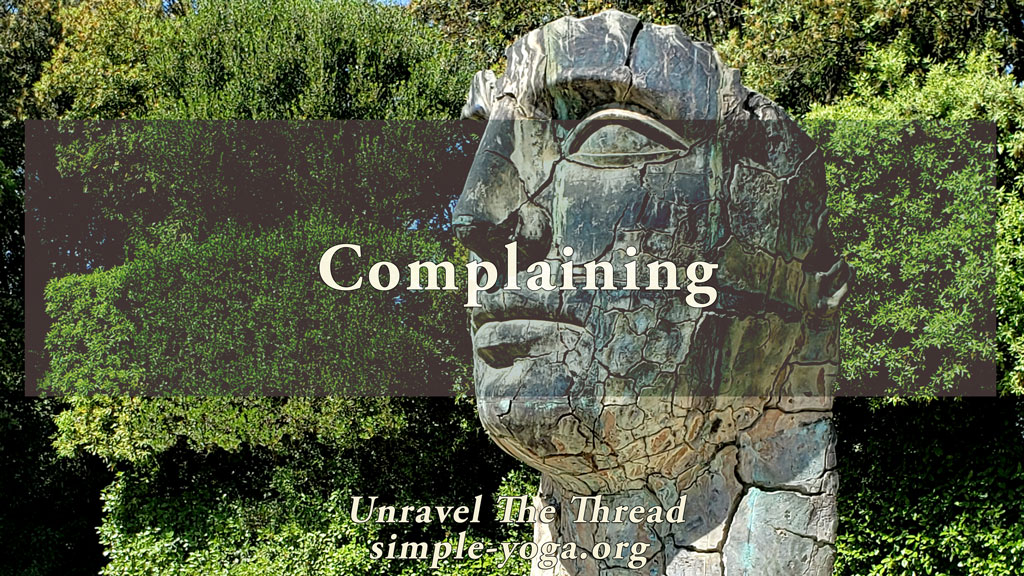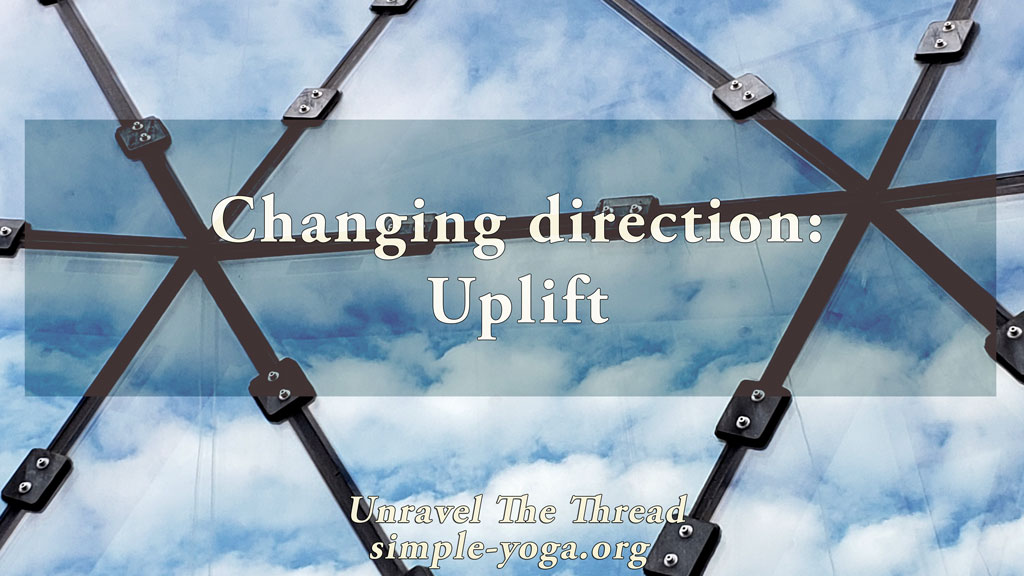Complaining

Complaining
It is fair to say that the most important practice in yoga is to be present, to witness with sharp accuracy what is happening in the moment we are. Anyone who tries to be present notices, often very quickly, that most of us have a tendency to get distracted constantly. Let’s pause for a moment to remember that in Sanskrit, tendency is one of the meanings of the word vrtti. These tendencies are what we learn to modulate in yoga.
One of the typical tendencies (vrttis) that distracts us from being present is the tendency to complain. For some reason, we feel the need to express our dissatisfaction or annoyance with something that has just happened, is happening, or that we predict will happen. Do you ever complain? What do you complain about? How does your dissatisfaction, anger, or irritation manifest itself?
Let’s take a moment to explore this. Find a comfortable position. Release tension from your body and mind, perhaps by taking a few long breaths in and out, and feel the sensations manifesting in your body right here and now. Bring one of your favorite complaints into your awareness. What is it about? How does it make you feel? How long have you been complaining about this phenomenon, situation, or event? Now take a few long breaths and let go of the complaint.
As we examine our complaining, let’s consider that the fact that you can bring up a complaint at will, and also let it go, means that you can at least turn your complaining on and off. This suggests that it may then be possible to modulate our complaining. This is important. Let’s be clear, rather than saying that complaining is bad and that no one should complain, it is more useful to explore the role that complaining plays in our lives.
When we reflect on our complaints, are there different kinds of complaints? Are there different types of complaints according to the characteristics of the situation we are complaining about? Or do complaints vary according to the effect of the situation on our mood? Are there general categories of complaints, such as complaints about the fairness of a situation or the usefulness or lack thereof of a process? There may be complaints related to a specific set of circumstances, such as when the weather interferes with our plans. As we continue this reflection, let’s pay attention to the recipients of our complaints: are our complaints directed at something or someone specific? Or are they an expression of our general dissatisfaction?
So how useful is our complaining? Are our complaints a way to release a build-up of tension and irritation? Or is our complaining an expression of frustration because our expectations do not match the situation we find ourselves in? To what extent does our complaining bring about a satisfactory change in a particular situation? Is it possible that some of our complaints are the result of holding a grudge or resentment? In that case, how is that useful to anybody?
In the spirit of applying the technique of gradual change of direction (pratipaksha bhavana), let’s explore two different paths of action. The first path is a very practical way of turning complaints into action. When we explored the idea of one-pointed focus in Yoga Sutra 1.32 we used two specific questions to direct our focus. These questions can be used every time we notice that we are complaining. First, when we notice that we are complaining, we evaluate: Is there something wrong here and now? If there is something wrong, we ask: Is it in my power to change what is wrong? If what is wrong is something we can change, then do it right now. If what is wrong is beyond our immediate control, then it is wise to give up our illusion of control. (Ishvara Pranidhana).
The second way to act is to see if our complaints are enabling us to improve the quality of our contribution to the moment we are in. In other words, we make sure that our complaining becomes an uplifting action. For example, if we find that something is not working, can we offer a better alternative? Do we have actionable suggestions for improving what already exists? In this way, instead of making our complaint simply an expression of our disapproval, which does nothing to change the situation, we can actually help make things better.
Notice that these techniques are tools for empowerment because they offer us ways to contribute our presence to the world in constructive and beneficial ways. Also, these ideas do not require you to change your beliefs or go against your common sense. As usual, instead of believing that this might work to resolve your complaints, consider giving it an honest try to see what happens. Imagine what would happen if all complaints were turned into uplifting actions…
If you prefer, you may listen to the podcast:
This is an excerpt from the book Unravel the thread: Applying the ancient wisdom of yoga to live a happy life
If you find Simple-Yoga.org and Unravel the thread useful, consider supporting my labor with a donation, you may also donate using PayPal or Venmo. Thank you!


